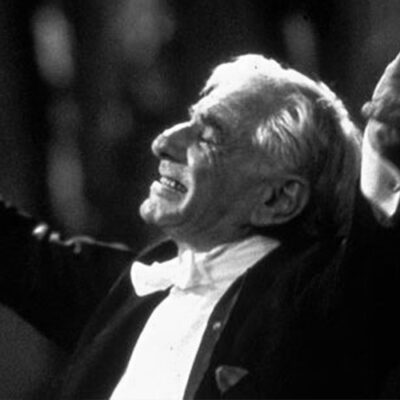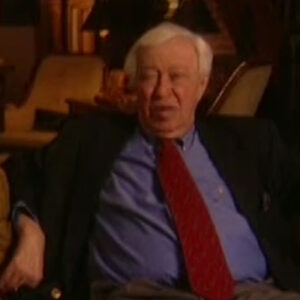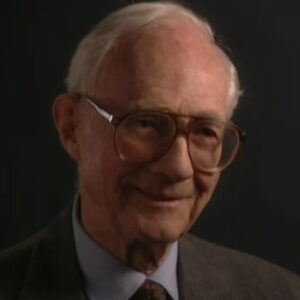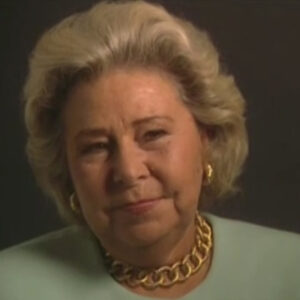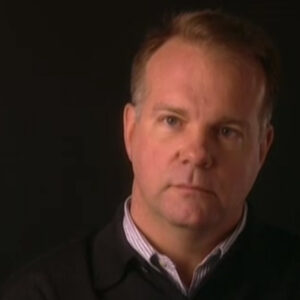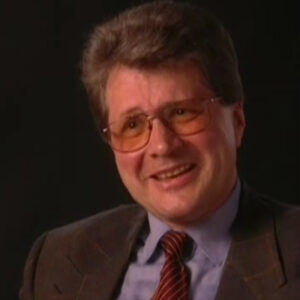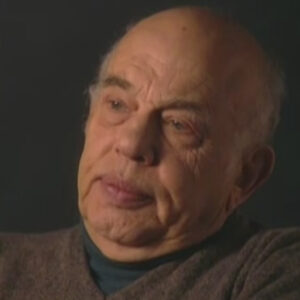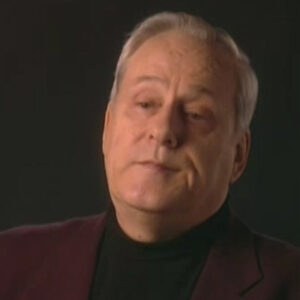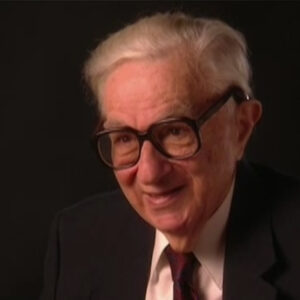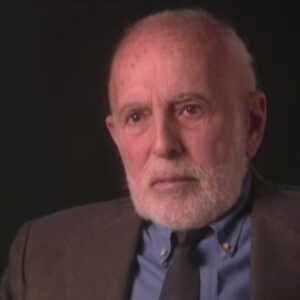Speaker Let’s start with the easy stuff, let’s start with how you how you met in New York.
Speaker Madam, when you read, I have absolutely no recollection of when I met him. OK, I’m sorry, but I don’t I mean, it seems ridiculous. He was so famous, but he wasn’t famous then, and I know he was.
Speaker But how did you come together working together?
Speaker Because of Jerry Robbins wanting to do. Contemporary version of Romeo and Juliet. And she or he was supposed to be Catholic or Jewish and was Easter, Passover.
Speaker And.
Speaker I thought it was a bizarre road set to music. So. I didn’t want to go along, Lenny didn’t want to go along. And then he and I started on another project. James James M. Cain novel called Serenade. About a gay opera singer. We wanted to direct and he this is. Oh, roughly 50 years later, he wanted to go back to West Side and. By happenstance, Lenny and I were both in. That pit of degradation, Los Angeles, and really in that pit, we were sitting at the pool of the Beverly Hills Hotel and they had been riots. And it’s also a time when juvenile delinquency was very much in the news and the riots starts talking about. Chicanas and Leny wanted to do it. Out out in the coast west, what became West Side Story, and I thought better in New York. We had Puerto Ricans and blacks and we got excited and. The rest is, as they say.
Speaker Could you just go back, though, and say that, if you wouldn’t mind, that originally this was actually called a story?
Speaker Well, that was because of Passover. Easter Jew, Catholic on the east side, not as we know it today. I mean, it was, you know, Orchard Street nine. Suppose Mulberry Street, I don’t know, we never do anything about it. There’s a funny story about the title when it was finally to be produced and called West Side Story. There was a man called this has nothing to do with. There was a man called George Abbott, big director in the theater. He hated the show and he was partly responsible for getting it produced, by the way, because he didn’t like it. And he said it needed a commercial title. So kiddingly, I said gangway. And they thought that was a knockoff and was on the back of all the scenery over the last minute someone came to their senses and got rid of it.
Speaker But Abbott.
Speaker This is very long and it really doesn’t have much to do with LENNEAR, I think you’ll cut it anyway. Let’s move on.
Speaker What I’m interested in having to do with the genesis of West Side Story because, well, wasn’t alone. No, he wasn’t alone.
Speaker It does seem like it’s one of the really, truly remarkable collaborations in the history of American musical theater. So I’m interested in anything that sheds some light.
Speaker Well. We had it was turned down by every producer in New York, including the ones who did it.
Speaker And then the one person stuck was Roger Stevens of Kennedy Center of Fame, and he had been involved in a couple of plays of mine. Roger is a wonderful man. He’s a. Man who rustles up much needed money and active producers, he always stuck and he brought up a woman named Cheryl Crawford, who was one of those good New England Christian ladies. And she had a big audition to raise money somebodies apartment on the East River. And Lenny played Steve and he sang and I told the story and we worked our asses off. And Ray’s not one penny. And Roger was going to Europe and he said to me, I think Gerald’s getting cold feet, but I’m sticking. So she summoned a meeting and for the Monday after Roger left, we all went to her office and we had to go into rehearsal in six weeks because of everybody’s schedule.
Speaker So she said, I think it would be foolhardy to go ahead. The book is absolutely terrible. So I said, wow. Does Roger agree with you? Oh, yes, she said. So I said, OK, Cheryl, you are an immoral, indecent woman, and we all got up and walked up. Now what? So we went to the Algonquin next door to discuss it over a drink where again I was the villain. I didn’t have a tie. They wouldn’t let us in. So I think Stephen Sondheim said, call Roger. In Europe, I call them from Phonebooth. And he said, don’t worry, I’m sticking. Still, this story got seems endless to me, Steve, because his great friend was how Prince, who is he, and his partner, Bobby Bridgforth, were producing a show called New Girl in Town, written and directed by George Abbott, which they thought was going to revolutionize musical theater. Well, it bombed in Boston. How was depressed and Steve said, do you think you’re depressed? We don’t even have a producer, we can’t get the bloody thing on. So I said, well, send the book up again. So they sent it up and they gave it to George Abbott. He said, it’s terrible. And I thought, well, what does he know? New girl in town is no good. So they said they do it. That’s showbiz, and that’s really how then they came down, they heard the score, they got the prices in half and produced the show and very well.
Speaker If you had to know, there is you’ve left out one or two things, your first day, one or two.
Speaker Yes, I.
Speaker Yes, I know this is the beginning, but the history in terms of your relationship to the project, if you could talk about, first of all, that you did not want to be the lyricist you did because you’re a playwright, did the book and how you worked in creating the book out of the Romeo and Juliet, Juliet, Shakespeare, play what you dropped and what you kept in.
Speaker And oh, the lyricist thing was kind of interesting.
Speaker I think. Lenny, what was going to. He wanted to do it himself first, and I think he realized it was too much of a job, and then they wanted Betty Comden, Adolph Green, who fortunately were busy, I say fortunately, because I think they would have been very wrong. And they had all worked together, Lenny. Jerry Robbins and Betty Annatto Steve Sanam had played the score of his first show. For me to serenade before I went to Lenny, because the producers of that. Never realized project. Knew him and he played and I told him I thought his lyrics were absolutely brilliant and I was not mad about his music. Which he remembers anyway, we were looking for a lyricist and then I went to the opening night, I hate opening nights.
Speaker I don’t know why I went to this one, but it was absolutely unforgettable. It was a play by a playwright who would ring a bell in everybody’s mind named Ugo Betty. And the play was called Isle of Goetze. All I remember Zuda Hagen downstage on her back, moaning and groaning. You can imagine what about and I saw Steve at this party. And as he says, I literally smote my father and said, My God, you’re the lyricist.
Speaker He was not thrilled with the idea, you know, in this country he wanted to. Be the lyricist and composer of his first musical in this country, you have to do everything about before you’re 30 or you’re a failure. And he wasn’t 30. And he went to Oscar Hammerstein after he met Lenny and Lenny liked him and wanted him to do an Oscar, was the one who said you’d be a fool not to. And that resulted in Lenny. Performing one of the most I think, the most magnanimous gesture I’ve ever known anybody to do in the theater. He and Steve do the lyrics together. The vast majority, certainly of the good ones were Steeves. But their names, both their names were on it. We opened in Washington and Sin City was unknown. He was not mentioned at all. And Lenny went to him and said. This is your career, it means nothing to me. I will take my name off. He did not give up his royalty, but that’s also show business or life anyway, he had children. I don’t know, think what you will, but nobody, nobody in the theater would do that.
Speaker I had a thing with Jerry, which is not. Well, it is germane, but I’m not going into it. Where was exactly the opposite. And Jerry and I had known as 100 years and was about this credit conception. And I went to him and explained and he said, let me think about it, came back and said, yes, you’re right. But it means too much to me, not Lenny. Lenny was was like everything else about him, he was unpredictable.
Speaker He was terribly generous. Which, again, is rare.
Speaker I’ve heard this story about Steve. Yeah, yeah, where it hurts that it’s I was very depressed because it sounded like it came completely from here. I mean, nobody had suggested it.
Speaker Oh, was totally Lenny. And what is odd is Steve came to me and said, should I do it? I thought you out of your head. Of course, you should do it, and it meant a great deal. I now just occurred to me, I think maybe he has because he doesn’t like all the lyrics.
Speaker He still doesn’t care about that, and he said in the interview, by the way, as well as he’s told me, he wouldn’t do it.
Speaker Oh, he said, we’re making a film about him as well.
Speaker Oh, he won’t go. He’ll do it there. He’ll do it there. What did he tell you in doing?
Speaker What’s today, Tuesday? Last Thursday, really, he went to London on Friday, yeah, yeah, well, that’s interesting.
Speaker We haven’t told us yet.
Speaker I think, you know, I know why. Why? Well, Sam is doing a piece about Streisand, and they asked me to do it. And I said, I won’t do it.
Speaker I.
Speaker Think when you have a lot of reservations about somebody, don’t go on television about them. Was that not a good working relationship, the working relationship was wonderful. Among the four of us until the curtain went up. You know Jerry Robbins very well, as I have said before.
Speaker There are only two things Lenny Bernstein was afraid of God and Jerry Robbins.
Speaker And.
Speaker I think that’s true of practically anybody who’s worked with them except me, I’ve known them too long. But he. He’s a brilliant monster. And everything went sour. I mean, we open in Washington with a preview, they all screamed and yelled and then he. He’s one of those Feebles never enough. Never enough. Opening night, nobody was talking to. The three of us, I mean, we didn’t talk to. When he came running up the aisle, he said, I’ll kill that son of a bitch because of something that happened. What have you done? When we were in out of town in Philadelphia, what we did most of the time out of town was change the second act, Ballay. That meant Jerry did. And one of the things about this show. You know, I thought the show would maybe run three months.
Speaker We didn’t really think of anything except making it as good as in our terms, and that wasn’t being artistic, it was doing something that you like doing for itself. And one of the things was, don’t stop for a hand. Well, in the second act. Tony and Maria start to sing this song, then it goes into a big ballet and it comes out of the ballet back to the song, which is where the hand is to come. Well, one night in Philadelphia. It was a blackout at the end of the ballet before they got back on the bed to sing and the applause was enormous. The lights came up and the two porked sang to the applause, which died out just as they finished. And they sat there like lumps. At that point near Jersey, neither dynasty was speaking to Jerry. They said, tell him, tell them you can’t do it. So I went and placated him and he agreed, and opening night, the blackout was back.
Speaker That’s when Lendu ran up the. So I’ll kill the son of a bitch.
Speaker Was it just because he has such conviction that he was always right, I mean, was he not able to see himself in something else?
Speaker It’s very simple. He did the ballet, the ballet got a big hand. I mean, people look for such complex motives.
Speaker Your your generosity in all of this process has been commented on by everyone involved, and you have the biggest job in the sense to have the best job. A very tough job with the book.
Speaker How much was the being faithful to Romeo Juliet a factor in the creation of love?
Speaker Well, you know, Romeo and Juliet, a very old story that Shakespeare got someplace in Italy.
Speaker I.
Speaker Broke, I thought it was absolutely insane to even try to get anywhere near the poetry. One of the things I did do was invent a language because. I knew, you know, this country is so hipped on being trendy and being with it, I mean. People who have their hair and spines and everything pierced except their feet. So because otherwise they couldn’t walk. It’s so tiresome to hear them say, oh, that’s cool, that’s cool, you know, when then used to be that’s it. Well, that’s groovy. And they don’t know there is conformists. Does anybody anyway. So I invented this line. Remember Carol Crawford saying she says you don’t know something about it with some expression about about the cookie crumbles. I said that will be out before we go into rehearsal. So I did invent a kind of language, which oddly enough, I know, but now I know. I put up that word cool. It was the first use of that word in that sense.
Speaker And then there were a lot of words that just weren’t words, but.
Speaker And there is in the meeting scene, I use the word hands a lot or several times because it’s in the balcony scene, but most of it was really following the story.
Speaker And the best the greatest compliment I ever got was in England, where God knows I know Shakespeare. And they said the mode of. To the message not getting through was better than Shakespeare because it relates related to the theme of the show. It didn’t get through because of bigotry. Prejudice, which is a basic theme of the show, was I had. We had almost no problem at all in the collaboration. One little disagreement. Jerry wanted. Period, to take sleeping pills, I thought that you breathe when you take sleeping pills. I’m going to think she’s dead. The other was. They didn’t want to write the song that became Krupke. They thought it was vulgar to have a comedy number, so I sold them on Shakespeare and the poor to sing. I got very grand and artistic and I worked. But otherwise, it was a. Oh, the wonderful collaboration. Actually, there was an opening number that Lenny and Steve wrote that I think is much better than the Jets on. But everybody thought it was then too far out. What was it? I don’t know what it was. It had a lot of gibberish syllables. The way I use a lot of stuff like that, it was. The jet song is a rather conventional song. I mean, I think the two. If I had druthers. That would be replaced, would be the jet song, and I feel pretty I mean. Steve will be the first to tell you and this girl from Puerto Rico’s wherever, wherever the things I feel funny and fizzy and fine. Well, Oscar Hammerstein, hello. Yeah, but. The rest of the stuff. I remember that I would tease Lenny. There’s a phrase where. Maria, thing I don’t know, I need to know either, oh, here we go into the Apple Land, that was a fight, not a fight. A had to be watched carefully. I think, Lenny. Always was a victim of. American musical snobbery. That musical theater was your second class citizen. And that’s why he wanted to write opera.
Speaker Whereas if I think if he had written more, you know, he. He would have been the best musical theater composer we ever had, even so, I think what he wrote for musical theater is the music that comes out of the pit. Was and is the best that’s ever been heard. It’s amazing. I agree and totally individual, and it’s a very American sound. It was pure Lenny with outdrawing years later, we started, he and I started to write a show called. Alarms and excursions. Which would have been fun and I would go up to the fly up to the Dakota to meet with him and after three or four sessions I left with the heaviest shoes in New York. He was pushing it to be opera.
Speaker I did not want to write an opera. I don’t think he should have written a no.
Speaker I don’t think his musical language was opera.
Speaker So you went by the wayside on the West Side Story comes close.
Speaker Don’t you think it’s possible to come to opera in the best sense of the word and still remain?
Speaker What’s the best sense of the word when you say opera?
Speaker I mean that it’s in terms of musical theater operates at a level so much.
Speaker I think I think to do almost anything. No, I think the difference between opera and musical theater. Is the voice it’s written for. And although West Side is not easy to sing, it’s not written for operatic voices. I mean, the album that Lenny made with all those operatic folk proves my point. They should have stayed an opera. I think he had his kids do the dialogue.
Speaker Yeah, and what was the process of working, if you could describe it, that that had to be imposed to keep if that was necessary to keep learning from going over that?
Speaker And I know exactly which phrase you’re talking about. Oh, no.
Speaker Yes. As a matter of fact, opening night, Steve Simon gave me a gold disc with that with that musical phrase written on it. We also had this has nothing to do with the opera thing. We also have what we call the cigarette song, which is one hand, one heart. And we were out of town in the auditorium to see four doors open. We all walked outside to have a smoke. That’s because it was written as written.
Speaker It was twice as long. We finally cut the I don’t know, musically, technically, I’m an idiot, they all very kind to embrace my ear, I don’t know one note from another, but that song was endless.
Speaker It was the original balcony scene.
Speaker And.
Speaker I thought it was wrong, and then he said, why? I said, well, it’s so pristine, he said, but that’s what they are.
Speaker Well.
Speaker I thought they were seething to get in the sack, you know, and that’s not pristine. But was Oscar Hammerstein, who helped he came to a run through and he said. That’s no better place than they wrote tonight.
Speaker I brought that on, which you think is less thing tonight.
Speaker The music has more of a pulse, more of a pulse.
Speaker I don’t think they should have screamed, I want to, you know, like some of the terrible rock songs. Whose subtlety escapes me.
Speaker What are some other things that you remember, the stories that you remember that I might not even know about because they weren’t written about in terms of changes that were made in terms of what the audience knows of now is the piece that shifted your money changes made.
Speaker The way we worked, I was my first middle school, the way I worked on, that’s where I’ve worked ever since and I didn’t know that there was another way.
Speaker I did an outline. We discussed it. Then I wrote ahead of them. And.
Speaker The best person I’ve worked with, Stephen Sondheim, I’m you know, it’s not really with such good friends, but he is the only lyricist I know who writes the character. Anyone can sing any song.
Speaker So. I had to ride ahead so they knew what the people were and what they were going to do. And that’s an road very fast. And then Lenny and Jerry work very closely, as I’m sure Jerry must have told you or will tell you or so forth.
Speaker Once we had a very long rehearsal period.
Speaker Part of that was.
Speaker I’m sure you know this, when Jerry read the book, he went on to direct the book, not to the choreography.
Speaker No comment. But we didn’t let that happen. And. He asked for seven weeks rehearsal. Which is longer than any show ever had, the reason it could be that long was money because there was nobody in the cast who got paid anything. And consequently, the cast was so well rehearsed. There was.
Speaker Jerry had an assistant who has since become a director named Gerald Friedman, and I walked into the theater one day and he was standing on a chair. Outside the dressing room, the transom was open and he was listening and I said I saw what’s going on. He said, well, they’re rehearsing the balcony scene.
Speaker So I said, well, why aren’t you in there is ramping up privacy.
Speaker Well, we had to get over that.
Speaker It was very, very peculiar in that sense.
Speaker What was the casting like and quite the casting was impossible.
Speaker There was nobody.
Speaker Who was fulfilled or nobody could, nobody ever could. Nobody ever will. This show is much too demanding. And ask them to sing wonderfully, to dance wonderfully and to act wonderfully and to be 14 years old.
Speaker Of all those requirements, to me, the most important is the age. And.
Speaker Only recently in a touring company have I seen it. There’s something about 15 and 16 and 17 year old kids. That not only brings a reality, it brings a vitality.
Speaker And they know what it’s all about. I don’t care when it was written. The interesting thing about this show dated. Anyone who says that doesn’t understand the theater is metaphore. I mean, do they think nobody use four letter words in 1957? Of course they did. They use them so much now, they have no meaning. As for guns, if you had as many guns as you have today, you wouldn’t get the show, would run 10 minutes and the whole cast be dead. But there is a word. That’s in the show today that has a contemporary meaning nobody ever thought of immigrant. You say that word in the theater today in this country and you can feel the audience absolutely freeze in silence and fear. It’s amazing, I think, when something is true. It’s always contemporary. And nuances change with the times. What dates is attitude? What was you need then to extraordinary for its time? That was a story.
Speaker You know, I don’t think I’m different from most people. I don’t think West Side Story was that innovative. I think it was the culmination of many things that had been. Tried or hinted that and finally came together. I think what really made it different was an attitude we all had that somehow came through. Which was that we didn’t care about anything like putting on the stage what we wanted to see. It wasn’t calculated and that was rare. And I don’t mean. I am a free artist, you know. You know what action painting is, why I think that’s a lot of bullshit. You know, these people throw paint on the wall and say, that’s that’s me. I’m expressing myself. That’s art. I think you have to know the rules before you break them. And we knew the rules and whether we broke them or not, there was a thing that happened. We were out of town and three of the kids. This was in Washington where we open with that wonderful picture of Lenny in a white suit coming, jumping through the doors. You know, I did his memorial when he died. And I got a lot of his famous friends and I remember Betty Bacall saying to me, well, when do we all come out and take the bow? I said, you don’t.
Speaker The last bout was Lennie’s, and I used that picture. And I asked everybody just to be silent. And I move right now when I think of it, because the picture is really an expression of Lenny flying and he didn’t know where.
Speaker Anyway, open Washington, there were three kids in the show, a terribly good, so they said, let’s give them another number and he and Steve over night wrote a song called Kid Stuff. Terribly good, and they played for the rest of us and everybody was terrific and I said. But that makes it a musical comedy. And everybody said, right, and walked out and that was it, that was how close we felt, didn’t matter that I said it, somebody said it, we were all on the same wavelength. Except for that bloody ballet.
Speaker But.
Speaker Nobody thought of being innovative.
Speaker That, to me, is so amazing. That you I would think that that would have been every time we got together and seeing this thing come together here in the U.S., that you would have been aware that you really groundbreaking history, musical theater. I care.
Speaker Oh, no, not for no, not for one minute. I mean, people said to me, why doesn’t she died? And I just had to be different. She Juliet called Maria doesn’t die because that girl was too much of a life force, she wouldn’t kill herself. What is funny is she was supposed to have a whopping big aria, so I wrote, as usual, a dummy lyric. Well, that’s the speech. They just. When you couldn’t find music and I don’t know, just sort of kept getting put off and put off, and I must say, if I thought of it, I would probably say that speech isn’t good enough. But fellow, these many years. She’s still saying it. Not singing it.
Speaker Accident.
Speaker That’s the way so much happens in the theater accidentally, there’s there’s a moment visually it’s tremendous when those streamers come down before the dance at the gym. That was an accident that happened during checking in Washington. It came and Jerry, so it said, keep it in, I was in. What was the. Overall, basic response to this story after it’s been here, well, in Washington, they went bananas. We the only clue we had was we had a run through in New York and the company loved the show, and when they came out of this run through with no Semyonov, no costumes, the kids themselves had chosen a color for the jets and a color for the sharks. And it was very moving to see that that they did it and. The audience was knocked out.
Speaker I was sitting next to a woman who at that time was. Well, we were very close. Lena Horne and.
Speaker She couldn’t say anything. She’s also the woman she was in a show called To Make, and I gave her the book to Gypsie to read and she said, you know, this is going to make Ethel Merman a star. But that was the only reaction of that audience. But, you know, those gypsy audiences, they go wild too easily. So we really didn’t know what. Civilians would think and at the first preview I was sitting on the aisle in front of Jerry, who began banging me on the back of my neck yelling, They like it. They like it, but they went wild. Then we got to Philadelphia where they had mounted policemen. To clear the way for the box office to take a turn, they’ll never get mounted policeman. By the time we came to New York, the word was out and it was bad for us, this was art. And that opening night almost killed the show, they came in as though they were going to temple or to church. I mean, they were afraid to react. And the show was dying. Until America that brought it to life, even so, the opening night was not, I don’t think, thrilling. But.
Speaker Why do you think that the people have the impression that it was or do you think it was because of money, because of this classical?
Speaker New York Philharmonic background. Well, as we said, no, I don’t think he made that much difference. Jerry came from the ballet. I came from, you know, it’s because people died on stage in a musical. I mean, it’s all very elementary. That’s why they thought it was art. You know who died in the musical? I mean, seriously delayed. And didn’t come up, you know, as a ghost or something like Brigadoon, I don’t know.
Speaker That’s nonmusical. That is an opera. And that is our. And it is wonderful.
Speaker See the analogy musically between between, you know, Porgy and Bess, because others have done it, perhaps.
Speaker Well, no, I don’t. I think the only real connection with musical theater and art is, unfortunately, the sun through things of Andrew Lloyd Webber and you know, where they think if you keep singing, it makes it better. Well, it did in one show, made it more successful. You know, Dreamgirls was a bomb and Boston. And Michael Bennet said, let’s sing the book. So they sang the book and it became a success, you know, people don’t hear too well with song. They don’t really hear lyrics take some quite some time.
Speaker How often you hear? I guess.
Speaker Well, particularly today, where we have an audience with busted eardrums from the decibel level at rock concerts, and I don’t care if people don’t like this, but, you know, rock lyrics, by and large, are infantile, puerile. The Beatles were rare and there are very few rock lyrics that can bear reading unless they’re on the box. A box of cereal. Yeah. I mean, you read you read anything at breakfast, Lesedi? I will.
Speaker So when the then it was obviously a big hit in New York, and how long was it between the Broadway show which did run? How long?
Speaker I don’t know. But I do know that the producers got cold feet when business fell off of the Wednesday matinee. They said, oh, it’s got a short run. And they booked it on a tour to California. And brought it back that same year where it ran longer in a bigger theater. It’s interesting, the theater, Roger Stevens was a great friend of a man named Bob Dowling, who was a big real estate character and owned theaters and this city and. I’m trying to not use four letter words, even if it’s a quotation. But anyway, Roger run Bob Dowling to give us a theatre. I think it’s now called the Virginia. And it was then the answer. Now, it’s not considered first rate. Then it was he said, I wouldn’t give a toilet to that opera. And we couldn’t get a theater now there was a theater, but it was on Broadway, and in those days Broadway was the last place you wanted to be. Well, the theater was the Winter Garden, it was considered a white elephant. That’s where we played. And now it’s a litter box for cats. You got something you said earlier that I want to go back to that Larry King’s own.
Speaker Sense of insecurity in the theater as opposed to right. I feel that that affected the choices I made in his career. I mean, do you have any insight as to why he may have felt this?
Speaker Very basic question?
Speaker But I’m curious that your sense why he felt it somehow opera was more lofty and more worthy than the theater.
Speaker Well, I can’t remember what year was, but it was late and I went up to see Lenny and he was depressed, he had the newspapers. Spread on the floor, he’d given a concert and gotten bad reviews, and I said to him, don’t tell me you still read reviews. He always cared too much about that. And. I don’t read reviews. I think the only way that’s the theater, I think the only thing that’s important is the last New York Times. If it works, its money runs off. It doesn’t. It doesn’t. He cared too much about that. He wanted so much to be accepted as what was considered by others to be a serious musician. I think West Side Story is serious music. Well, it was sneered at. By the classical community. Oh, let me go back to being serious, and that got in the way he. He also, after we all did, where we met. To do discuss doing another show together, which, of course, we never did, I wanted to do something about race and he said, well, whatever it is, it has to be important. That was a side of him that was wrong because good is important when she knew. He he and Alan Lerner did a show called 6500, and they asked me to direct it and I had two meetings with them and they didn’t know it was about Blatt’s. They really didn’t know, which amazed me. So I withdrew. And. He called me up and he said. I want to ask you something, as a friend, I want you to tell me the truth. Do you think I should go on with this show? And he knew me very well and I said no. And I say he knew me very well because most people, you know, say, oh, wonderful, go ahead, you know, think to yourself and there’s a bit of schadenfreude in there. I wanted him to stop, but I knew it wouldn’t work. Then they did it and he was down in Philadelphia. And he called me to come down and see the show. It has some lovely songs in it, but it’s unworkable, it just and. I sort of beg him to close it and he said, I want you to take it over. I said, I’ve told you before. So then I told him we got a black director and then I did something sort of behind his back. One of the producers was Bob Whitehead, who would produce play in mine. I knew and I liked enormously until four o’clock in the morning. I sat up begging him to close that show because of a show closed in Philadelphia. Nobody knows. And I didn’t want my friend’s show to come into New York and die. But Bob didn’t tell me was Alan Lerner had got the money from Coca-Cola. On the condition that are open to New York. So I had no choice. Lenny never knew that or knew later.
Speaker Would you mind something about sixteen hundred Pennsylvania, I never seen a recorder or tape or anything. If you were there, what was unworkable about it didn’t work.
Speaker Everything was all over the place. They didn’t. I’m notorious, as I always say, what is it about? First question doesn’t matter what it ends up being about because very often, but it ends up being about as not what you thought, but you must have something in mind which will then be a close line and you can hang your whole show on. You go to that. This was supposed to be the White House as seen from backstairs, who was backstairs. But were then called Negroes. Well, then it had to be about them. And it was there you you cared about and not Dolly Madison, whoever was running around in hoop skirts. Well, it was a conflict right away that would and they didn’t know where they were. It was the whole bit about George Washington and his false teeth. We’re, you know. I want. I forgot about this when we were riding West Side. I guess something like that was entering because I rode in a stage direction braggadocio and a bear to mento cross hand-in-hand to keep that element out of this. Was he left, he got. Did he ever talk to you that about working with him, dealer in that count, that collaboration was working or how different it was from other collaboration? Well, you know, I don’t think you can have a collaboration between two crazy men, one is enough. Allen wore white gloves, you know, because he would so it wouldn’t bite his nails, which he bit through the gloves, that kind of thing.
Speaker I was really crazy. Lenny, he was heedless.
Speaker Lenny believed he could get away with everything, and I remember the last time I saw we had dinner alone at his house a couple of weeks before he died. And.
Speaker When the pain hit was visible. You can really see it. Didn’t. Same time, there he is, and I said to him. Lying.
Speaker You’ve always been very lucky and you’re going to be lucky now, he said, no, I’m not going to beat this and I know it. And there with all this and talking about death quite openly and the pain hitting, he said, you know, I’ve never asked you what you did in bed. At that time. That was Lenny.
Speaker No, I didn’t tell. But. He was the most. Extravagant, personally, I mean, emotionally, the I you. And he, you know. He really took on the world. He was marvelous to be with one on one, that’s when he was best. I think. For two reasons. Yeah, he was a performer, a conductor as a performer. Well, when you’re one on one, there’s just a pathetically small audience, the other one was.
Speaker He was in care and he was interested and he listened and you could really connect. And you could talk about anything. And he knew a great deal about everything. What do you think he was looking for? Oh, unfortunately, everything. In every area. Is foolish. Do you think that he dissipated is the way he lived his?
Speaker All things disengages for you energy, how do you think it affected you that? I don’t think it disappeared either. You are what you are, and I think all that extravagant living will have to do with creating two.
Speaker That’s the way he was you. You can’t regiment anyone. Even a robot, that’s the way they’re going to be. Well, Lenny was the opposite, and that’s how he was going to be, I think, his personal disappointment. I’m pretty sure this was that he didn’t create.
Speaker As much as he wanted to, and certainly with all that ego, he never thought he was really good enough as a conductor. Yes. You know. Someone once said to me, I understand it was you who called for his call letting a Renaissance man. I said no, it was Lenny who first said, I first go to a Renaissance man. But I did want to say to him. Why do you try to do so much? He said, if they say I’m not the best classical composer, I say I compose Broadway. If they say I’m not the best Broadway composer. I say I’m a conductor. If they say I’m not the best conductor, I say I’m a pianist.
Speaker He wasn’t fooling you.
Speaker Well, not entirely. I think there’s a great deal of truth in that in the. He didn’t satisfy himself, which I think is good. I think when you believe it, you did. Dinner lendee wages.
Speaker I think he was asking this question, and you mentioned the obvious question.
Speaker But, you know, I always wanted to write a sketch of famous people dying, I’m raising their last words. A, which makes me wonder about what you just said, you know, that Gertrude Stein story and what is the question? Well, that is what is the answer, you know, or vice versa? My absolute favorite one of all time.
Speaker But I the people to do oh. What do you I mean, you saw a lot of time with your friend.
Speaker Do you regard. Yes. Absolutely. I remember once I called him. And congratulating one of them and honors he’d gotten, he didn’t even answer, I had done something. That he thought was terrific and that’s all he wanted to talk about.
Speaker That’s also very rare.
Speaker He was he was a very. Good friend. I knew I could count on. That’s what a friend is, you know. And it was a joy to be with when you were alone with her. What happened when you were with.
Speaker Well, he was a star in a world I don’t much like. I mean, those parties to me are just. Give you a monumental headache. I mean, when I was young, I used to be able to do it, but you have to work so hard, you know, smiling and being witty and with it and thinking, can I leave yet? So I don’t go. I didn’t go very much. I didn’t like those parties at the Dakota. Everybody was on and the finger was on them, you know, the bell rang and Pat loves a whole collection of dogs started raising. Do you think that people are try to impress? Oh, you impress. Wynnum. He. As I said, he was outrageous. I can remember once. There was some.
Speaker Party at a restaurant. Which meant that it was whoever gave it got the restaurant for free. And he was sitting between. A young man who was his boyfriend. And a woman I won’t name who is rather well-known journalist.
Speaker And he proposed to her with his arm around the boyfriend, and they both understood exactly what he meant, he wasn’t putting one of the other down. He wanted both at that moment.
Speaker Bureaucrat calls it pansexual. It was more than sex, I think emotionally he was very greedy.
Speaker And he he wanted. Everybody to love him, and I think one of the reasons we were friends. Was that he knew that I liked him and that was it. Was never going to go any further. And. I didn’t like everything he did, and he knew that to. I think that’s another reason we were good friends. Basically. You don’t want. You know, a lot of task forces around.
Speaker I mean, he had them I never saw more second concern around anyone in Iran, Lenny, why didn’t why do you think he happened?
Speaker Because very obviously he had an enormous ego that had to be fed. It had to be fed. And they were there to do it and, you know. Just the other day, some.
Speaker Some woman, we say, well, she once went out with Lenny and she married somebody else and he told their child, he said, you know, I once had an affair with your father. He would do things like that.
Speaker You know about Lenny.
Speaker The memorial for Betty comes husband. Well, you do know about that, I don’t know what she told.
Speaker Yes or no? Yes, I do. I mean, I read, I read well, it was it was Lennix. He said he wasn’t sure which one of the two. I love it.
Speaker Right, Betty? That’s the way it began. Well, the day before, I don’t know. For some reason, I saw him. He said, you know, you go to these memorials and these funerals and everybody just tells all this tough stuff. It’s all nonsense. It’s not what they’re really like. What can we tell the truth? I said, well, I went in, for God’s sakes, not tomorrow. But obviously his mind was made up. So he said he met Betty and Steve. And when he met them, they were both so beautiful. You didn’t know which one he wanted. Well, that wasn’t so bad. And then he said Steve was so nice. Of course, at a dinner you thought, my God, I hope I’m not sitting next to him. And it went on like that. And people were sliding lower and lower in the pews. And finally he got off and the next person was Isaac Stern, who just picked up his fiddle and, like, mad and got everybody out of that.
Speaker Now, was it innocent? Yes and no.
Speaker Yes and no. I’m going to say something won’t make sense, it wasn’t entirely innocent, but it was not malicious. He thought that’s the way it was. Why not say it? I think also the world allowed him to say they wanted to be outrageous. They wanted him to wear capes and not coats. And he did. There was a an unfortunate revival of West Side. Which was so widespread. Sliced white bread even. Anyway, we were it opened in Miami. We’re all staying at this hotel and then he decided he wanted to scuba dive. So he and. A young man whose is this not forget his name, his father had been killed in this country to tell you something like that politician, some grisly story. From Salvador or something like that, anyway. So Lenny and the kid appear with the tanks, you have to learn to scuba dive, you have to learn how to use a tank in the swimming pool. So thank God comes Mr. Bernstine. You can’t be in the swimming pool with the tanks that people swimming here. He said, I’m Leonard Bernstein. Tell the manager. Well, the manager came and said, get out, he couldn’t believe it. He took it for granted that he could go into this, but the sight of them with flippers and scuba diving tanks and in his swimming pool that it wasn’t the final blow was a photo like that. And it was almost a joke. Miami Beach joke.
Speaker That’s very funny. Apparently, he considered himself of all kinds of activities.
Speaker Oh, cowboy. Yes, very big with cowboy hats. Let’s go back to we went skiing together once. That was rather typical of this is when we were going to write that musical and at that time I would I was skiing in Aspen, it was before Hollywood. So he arrived and he had a friend with him and a piano. And he said, oh, he could ski and the skiing in Aspen is not easy. Lenny really didn’t know how to ski, but he went down the mountain as though he did and I looked at him and I thought, well, there goes the conductor of the Philharmonic finished not on his ass. I’m just going to break everything in sight. He didn’t somehow he got down. Didn’t faze him for one moment, that’s the way he was with life.
Speaker He said something earlier when the camera wasn’t going to let his greatest legacy. With his life the way he lived his life, so.
Speaker I don’t remember if if you know, you said that Lenny is very interesting when he said, you know, at the end of his life, this is all portrayed as. It many here today talk about.
Speaker What Lenny would say about himself would depend on the day. He he was very much of the you know, they talk about living in the now, he lived in the second in the instant and. I think he was so spoiled by the world that he thought he had permission to live and say and do whatever he felt.
Speaker Part of him knew, though part of him always knew he wasn’t far from being. Self-deceit. Which is. Both good and bad, sometimes it’s better if you can deceive yourself enough, I don’t think he could ever get away from himself. Which was one of the things that was wonderful about him, was he not deceived about.
Speaker What was he not? He said he was stopped to see what was and not to see.
Speaker Well, he was not.
Speaker It was it was not what he would want himself to be. He never really was. All the things he wanted to be. And he knew it some things, things that he cared passionately about, you know, you mentioned or other people mention Marla. That was pure and there was no self-deception, no worry there, because it wasn’t about Lenny. It was about Marla. I know he was conducting, but he was bringing someone he thought had been neglected genius, he was doing it for someone else that was pure. The minute he entered into it, his doubts entered. Which is human.
Speaker She said earlier, I’m not seeking a contradiction here, but he was just so spoiled by the world, they thought you could do anything they wanted, but it wasn’t lavished upon by the critics. I mean, you really did have to deal with.
Speaker Yes, and then he got older and you know what happens, you get old enough, they say you’re wonderful and you die and they really say you’re wonderful. I said the world. I mean, this man was surrounded at the critics, of course, and he did pay. It is a contradiction in one sense, but it’s the thing that anybody in any form of. I have to say, the entertainment world. Has to live with the less you pay attention to the critics. The better off you are, because then you will still strive and you still will try to achieve what you sell the time, but I’ve never known anyone in my life who had more people, you know, throwing roses before his every footstep there all over their place, offering themselves. Well, how could you not resist? He was he was human. Some of this bad behavior towards. A man who clearly had the capacity to truly have. Explain that behavior for so many people. What behavior of cruelty to people? Really overblown in there. Well. I can’t explain bad behavior, I didn’t see my relationship with Lenny stayed the same. He was my friend quite soon after we met, we stayed friends.
Speaker He always behaved. Warmly and lovingly to me. And to the most important person in my life.
Speaker So I. How he did to other people, I’m sorry, that he behaved what’s considered badly. I didn’t see it, but I was really trying to get it.
Speaker And I’m trying to understand myself because it seems in some ways some in Congress, these. It’s also human, but I’m just wondering if you think maybe towards the end of his life like himself. It may be the sort of reckoning that happens.
Speaker Well, I would describe something to you, Lenny had a seventieth birthday at Tanglewood with a whole concert and a lot of friends, famous friends appearing and going. And I was invited with my friend and we went the second night because that’s the way it is. I mean, you know, then you’re going to get Lenny, you’ll see the same show and you don’t have to get all the nonsense. And we spent time with them and watch these other people. And, my God, how they ran out to caucus was appeared. And you never saw such a rush to get to Dukakis’s side because there was a camera. Anyway, the weekend is all over. So we went to say goodbye to Lenny, and he’s selling and it was very hot. And he’s sitting in this house he had rented with a huge stack of books he’s autographing. He was wearing a pair of shorts and nothing else, and he had a huge bloated belly and he was alone and right. Autographing these bloody books and not sycophant in sight or a friend.
Speaker So if he behaved badly. There’s a reason. The hoopla was over, they went home.
Speaker There was no camera. You have more friends when there’s a camera.
Speaker I think also his physical deterioration affected him because he was quite vain.
Speaker And that makes some people bitter.
Speaker He also had a difficult relationship with his sister. I think he probably loved more than anyone. It was difficult for her to accept his homosexuality. And he knew it. And I said to her.
Speaker If you love them. You accept at all? She finally did, but it was. It hurt them. And it hurt her.
Speaker Do you think it was difficult for her because she had a hard time that an abstract notion or because he was. I’m really not going to tell you why. I thought surely that’s right. You know, there is this thing for you there, but she’s she’s very lovely. She used to be my agent. We fell out on that issue. I have a heart to the Bernstein’s, a very adept.
Speaker And not seeing the elephant on the coffee table.
Speaker Well, you mean you just think of yourself brought up with the man and everybody is a genius, and who are you? And then I think they wanted more of him than they should have. They wanted. They wanted him on a podium. And don’t you have any urges? They are not for the cover of Time magazine.
Speaker That must put a tremendous amount of pressure on. He was very mischievous. A new.
Speaker Can you elaborate on that?
Speaker No, I don’t want to I it’s even I won’t say and if I want to say it’s going quite far.
Speaker He was you said a man. Everyone says the genius. Do you think I hate that word? Actually. Do I think Lenin was a genius?
Speaker I think it was genius at life.
Speaker I don’t know about, you know, how good is anybody, the answer comes very, very long after you’re gone. We don’t know. I mean, we judged by what by past or what’s now, and you look at people who go out of favor and suddenly they’re back. I mean, Jane Austen, they make some movies, she’s now the greatest thing that ever came down the pike, but the movies are over. They’ll forget her. I don’t know. I think for me, he wrote the best. Theater, music, I don’t say songs, theater, music, I think it’s ever been written for Broadway. I think it is a wonderful composer, conductor. For certain composers, but isn’t any conductor? Which I’m curious, which which which repertoire do you think he was not that great? I don’t know enough about music to put myself out on a limb about that one.
Speaker Well, you can sort of tell bad things, didn’t he? You can tell by the things he didn’t do that I found interesting on the topic. Yeah, he didn’t do very much, but it was probably nonnegotiable. To technical, yeah. Did you? Did you work on anything together besides you, you had some no efforts, but no, no, no, no. It’s just before we finish up, you tell me a little bit about the movie. You were involved in the movie? Oh, no, I wasn’t. Oh, no, I had no hearing from the group. Went on to being involved in Monice.
Speaker That’s the song of Jerry Robbins, not Lenny Bernstein.
Speaker Was you said. Let me tell you.
Speaker I don’t know how many Oscars Jerry Robbins got, but Jerry Robbins was thrown off West Side.
Speaker Early in the shooting. But he took the Oscars. Zimbabwes get one to.
Speaker Co-Director choreographer Jerry didn’t even finish his own, if somebody else to it. That’s why he hasn’t done another movie. He cost too much money, it’s all money.
Speaker Yeah, he I heard he did this during Lluvia Specky, also did this during the.
Speaker The Broadway piece, but in terms of the of the rehearsal process he brought to the city with allow the jets and the sharks to like, eat lunch together and talk to each other and build that sort of atmosphere of hatred.
Speaker Oh, well, it was. He had he said to one group before the Nazis knew of the Jews, but these are kids sitting backstage knitting. What do they know and if I got to the point. I went to the producers and I said, I don’t think you can direct actors. And actually. I don’t think on the stage choreographers can for a very simple reason, they use people as bodies. They do not use what’s inside them or in their heads, so the producers when said, would you say that to Jerry? I said, Sure. So, Jerry, are you sit by me. And and then he would say, you take the scene in the ladies room, in the men’s room. I learned a great deal from it. He’s a nobody can stage a music more brilliantly than Jerry Robbins. He also will take help wherever he gets it, but no credit. And we’re not.
Speaker I mean, that’s Van. I mean, you talked about some time earlier they needed the horses because I didn’t say not because right here.
Speaker Stage his character in the sense of the collaboration, the musical lyrical book collaboration you all experience. What do you feel that, Lenny, intellectually? I mean, he wrote beautiful music.
Speaker I mean, what was the intellectual connection to understanding the story and the character Jimmy stories about, you know, the person that I work more with on that, with Steve. I mean, obviously, I have enormous admiration for Steve Sondheim.
Speaker He’s one of my closest friends and I, you know, and he helped with the music. I wasn’t there.
Speaker You know, I know you did real quick. I was there occasionally, no, Lenny, like when we did Gypsys, he did help quite a bit, but. Anybody needs editing. And I assume. The help came there. But both he and Lenny like, in my opinion. Is by Julie Stein at. Julie Stein.
Speaker Had melodies pouring out of his fingers, he put his hands on a piano and there was a tune you couldn’t forget.
Speaker They both. So conscious they don’t let it come.
Speaker This of in record time. Thirtysomethings, do you think the melodies are so great? Oh, I do. Well, I could give them even the interstitial stuff. Well, let me tell you when.
Speaker The show opened with all this stuff. The score was not successful. To such a point, and the proof is always money. The producers led us, the authors own the music rights. Then it was sold to the movies for two cents and the picture was made and the soundtrack. Is a reason I’m wearing this suit. I mean, we all made a fortune. But the music was not popular until the movie. Nobody sang those songs.
Speaker And nobody does the music itself, that’s if you want to use the word art. It all makes a work of art. But in the sense of American tunes, no.
Speaker Yes, it’s not that specific. Thank God, no. I know right now what you mean. Yes, yes.
Speaker What do you sing from West Side Story?
Speaker And maybe I’m not the right one to ask because, you know, I really notice, you know, the score you’re talking about, the score is starting to come in. Maria, tonight, love tonight, I mean, I love the content most, the quintet is America. I like I like somewhere there’s a place for where I like I like to I guess the closest is somewhere.
Speaker But they’re not.
Speaker But American popular music in the theater was and is I think there’s a great lack of songs in the theater. Given that, though, how do you mean this is a hard question to answer.
Speaker I love your speculation. How do you explain his enormous popularity, given that really, really U.S. history is rather singular because the scores are cohesive.
Speaker It’s all of a piece. He is one of the very few composed what Dick Rogers, what Julie Stein. They had this great melodic sense and did. Rogers is obviously a worshipper of Brahms, but Lenny has a Bernstine sound. You know it. You hear those chords and you know it. And I believe that an audience doesn’t have to be educated. They know, they feel, they sense. And when they heard that all put together, they were thrilled. And they went with it and they didn’t think and they didn’t have to come out singing the song itself, and it’s almost like praying God help them. You know. I mean, that shows the starts and also who is going to end the first act of a musical, but those just notes dribbling off.
Speaker If that’s a moment of genius, pure, and that’s Lenny.
Speaker Was Lenny involved in staging at all or did he come? Well, he and Jerry worked very closely. Jerry would say, I want to do this here, and then Lenny would write and vice versa. As for what they were to do, he was about Kest. Yes, I remember when we were down to Carol Lawrence and he said, you know, in those days you said, Miss, not that buzzing sound. And he said, Miss Lawrence, how old are you? And I said, she was the character.
Speaker I mean, we were stuck. She had to be. He was. I think the most demanding of. All of us.
Speaker It’s Jerry. He wanted dancers. That came first.
Speaker Because they’re singing Larry Kert was supposed to be he was auditioning for Riff. We never found a Tony. But eventually, the jury was, Tony. It did look like it was supposed to be here, but we couldn’t find anybody else.
Speaker It is something that you probably don’t want to do and I don’t need it, and I be for a younger generation of people who may not be familiar with West Side Story.
Speaker Not that it would be kind of useful if you could simply say the West Side Story took its inspiration.
Speaker Romeo Juliet and Maria was about it, though, and tell the story of West Side Story was the friar and whatever.
Speaker If you could just do that. I don’t know if I use it or not, but I’ll bet anything you won’t want to do it.
Speaker I’ll take a crack at it because I like you, but this is a great mistake. Well, Sermon’s bankers, they used to say who said that for now? And I think. West Side Story is based on Romeo and Juliet. By a man not much studied, William Shakespeare.
Speaker Romeo is Tony. Juliet is Maria, and in our version, it’s a story about how love succeeds in a world of violence and bigotry. Which unfortunately, is why West Side Story is still timely. Because I don’t see that. We’ve gotten made much progress there, the other characters, there’s the Kuzio who turns out to be Riffe. This was his best friend. There’s a frier. Who was?
Speaker Hopped around in a cell where Romeo met Juliet. It’s now dark in the village drugstore. I don’t remember all of them because I think a lot of them are made up. I wasn’t too much connection with them. And the the plot is essentially of two people kept from different families. It’s also we added another version in this country, but the Hatfields and McCoys and it’s all over the streets today with the various gangs, the bloods and the whatevers.
Speaker Except in those days, they had parents. Just a big difference.
Speaker We don’t have parents in the show, however, which is more like today. That’s very interesting.
Speaker This is probably this is kind of a subject that I was not telling the story very well, but I got there is was there any kind of a hue and cry at the time? I know we talked about this earlier, but it wasn’t quite sure what the answer in terms of the portrayal of Puerto Ricans or anything like that, because certainly the president came in given the impression that that was well.
Speaker It was the only. Hue and cry, or as you put it, about the only public reaction against West Side was how dare you let. Three people die in a musical comedy, the fact that it was an integrated show, they. Which certainly was new. They sort of pretended not to notice. There was no as far as the Puerto Ricans. You know, the whole Hispanic influence in this country has grown enormously, and oddly enough, the play is done. The show has done much more now in Hispanic communities because they are very strong and they’re treated by equals. And there’s a line where the leader of the sharks, the Hispanics or blacks or whatever you want to call them. He. Says we don’t go for that pretend crap.

